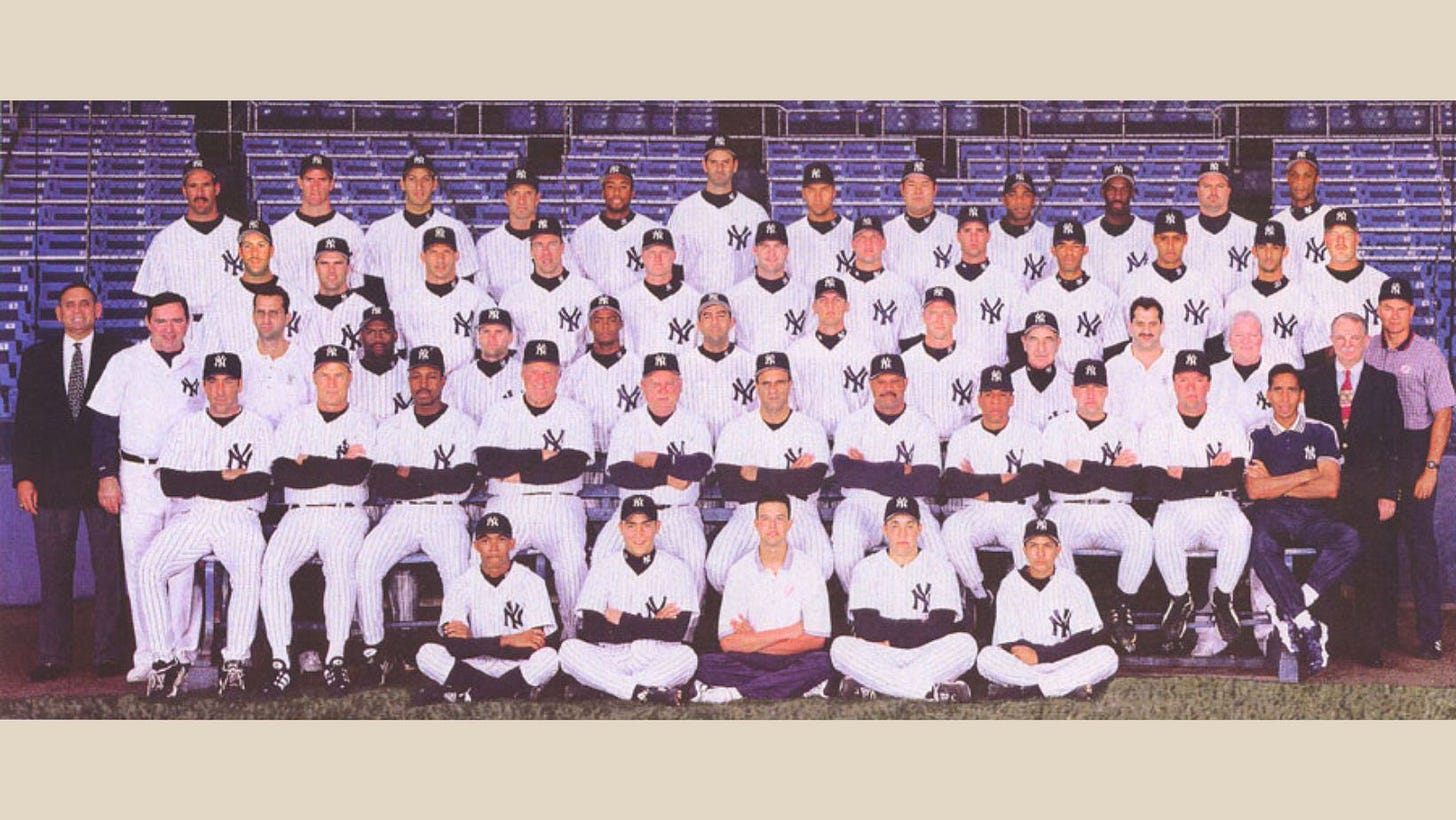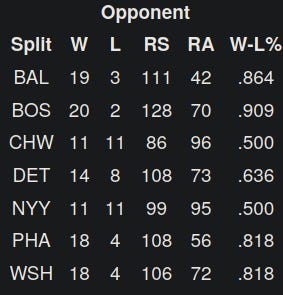Does Postseason Success Matter?
When we last left off in this discussion of baseball dynasties, we were talking about an old Baseball Think Factory thread previewing the 2006 Yankees.
Now, the 2006 Yankees aren’t going to come up on anybody’s list of the greatest teams of all time. However, the thread and project that resulted from this early discussion is fascinating, and touches on numerous issues of interest to all replayers.
The Great Debate
The great debate is an old one. Which is the greatest team of all time? And, most importantly, what criteria do teams need to meet to become eligible for that title of “the greatest of all time?”
In the case of this particular dated message board thread, the reason for this debate was simple. Our message board denziens wanted to create a Diamond Mind Baseball league to settle, once and for all, the question of which team was truly the greatest.

Now, this debate stretched on for about a month, covering two full threads with something like 1400 posts. It can take a while to find if you don’t know exactly where to go on the Internet Archive. The first discussion thread is here, and the second “ballot” thread is here.
The fun part about this debate is that the participants brought up just about every single argument that arises in these “greatest of all time” discussions. The part that isn’t much fun, however, is the fact that these threads were so poorly organized. Reading through them is like trying to follow 20 conversations at once.
I’ve thought a lot about what the best way would be to proceed with this discussion. I think the best thing to do is to dig up some of the core arguments made and discuss them in individual posts over the coming weeks. There are good answers to some of the concerns that arise, though there aren’t necessarily satisfactory answers to all of them. And, sadly, today’s topic is one for which no answer will likely suffice.
Does the Postseason Count?
Most statistically minded baseball fans will tell you that the postseason is a crapshoot — that it simply doesn’t matter. Bring up a famous postseason failure, like, say, the 2001 Mariners, and they’ll bring up an argument like this:
But there’s a problem here. If the postseason is a complete crapshoot — that is, if we cannot rely on the postseason to tell us which team is the best team of all time — then why do we even play it? Why not simply crown the team with the best regular season record at the end of each year as the grand champion and be done with it?
The truth is that baseball is not played in some mathematical laboratory under conditions ideal for statistical analysis. Baseball is played by people, and is managed by other people. These people tend to have a single goal in mind, and that goal isn’t to repeat the feat of the 1906 Cubs by dominating the regular season but losing the championship.
Perhaps Andy, one of my favorite posters of my Baseball Think Factory days, said it best:

But let’s dig in a little bit more.
The Postseason Is A Crapshoot
The classic argument for the postseason being a crapshoot comes from 1960.
You should know about the 1960 World Series already. If you don’t, it’s not hard to explain:
The Pirates won the 1960 World Series in 7 games, beating the heavily favored New York Yankees despite being outscored, 55-27. Pittsburgh won game 1, 6-4; game 4, 3-2; game 5, 5-2; and a famous game 7, 10-9.
The Yankees, on the other hand, destroyed Pittsburgh in their 3 victories: 16-3 in game 2, 10-0 in game 3, and 12-0 in game 6.
Can we look at those results and seriously conclude that the Pirates were the better team? At some point in time we have to ask whether a 7 game series is long enough to account for plain luck.
By the way, if you’ve got a few hours to kill, you really should listen to the 1960 World Series radio broadcasts. All 7 games exist; you can find them here. And, if you haven’t seen it yet, go watch the TV broadcast of the 7th game here.
The Postseaon Reveals The Truth
There is a good argument, though that the postseason might tell us something about the weaknesses behind teams that usually come up on the list of all-time greats.
The classic argument here revolves around the 1954 Yankees. This is the best-worded version of this argument that I’m aware of:
In other words, the 1954 Indians won 111 regular season games largely because the American League was hopelessly weak. If you take a look at their record against each American League team, you can see why this is actually a good point:
That’s right: the 1954 Indians did get that huge record by beating up on Boston, Baltimore, Philadelphia, and Washington. The Tigers finished right behind the Red Sox in the standings that year, at 68-86; Cleveland only managed a 14-8 record against them. There were only 2 other American League teams with winning records in 1954, and Cleveland played only .500 ball against them.
Is there any wonder that they fell apart in the World Series when they played a good New York Giants team? Playing the Giants in October was a lot different than eating the 100-loss Orioles and Athletics for lunch.
In other words, in this case, it is possible that the postseason tells us that this team wasn’t quite as good as the record might indicate. It’s possible that the 1954 American League was just a weak league overall.
The Debate Matters
Now, this debate really does matter. This isn’t just something we’re throwing out there for a hypothetical exercise.
We know that the postseason matters because nobody calls the 2006 Yankees an all-time great team. I don’t believe that the 2006 Yankees have a Domination Index rating that would raise any eyebrows. They did have a great offense, though — but they didn’t win over 110 games, nor were they able to advance to the World Series. As a result, they have gone forgotten.
We know that the postseason matters because it comes up every single time we have this debate. Look at this list of the top 28 single-season Domination Index teams of all time, as calculated by Neyer and Epstein:
Of these 28 teams, the following did not win the championship:
1906 Cubs
1962 Giants
1917 Giants
1995 Indians
1988 Mets (they did not advance to the World Series, losing to the Dodgers in 7)
1969 Orioles
1912 Giants
1971 Orioles
1974 Dodgers
1905 White Sox (they finished 2 games behind the Philadelphia Athletics; frankly, their Domination Index mark is mostly due to their dominant pitching staff, though we’ll talk about them a bit later)
1998 Astros (lost in the first round of the postseason to San Diego in 4 games)
1949 Dodgers (and they’re not doing well at all in my 1949 Diamond Mind Replay so far)
That’s right: of the top 28 Domination Index teams in the 20th century, 12 did not complete their goal of winning the title — that’s 43%! We could technically also count the 1902 Pirates, though there was no World Series for them to play in.
No matter how you measure greatness, you’re going to have to deal with this problem. For example, if you want to ignore the Domination Index and stick with winning percentage, here are your top teams:
We’ll ignore anything before 1893, since the game was fundamentally different then. And we’ll ignore the 1897 Temple Cup for now, which was so poorly attended that they cancelled the whole series.
Ignoring those 4 teams gives us a list of 11 teams total. Of those 11 teams, 4 did not win the title — again, that’s 36%!
Which Side Wins?
The sad truth is that I don’t know which side wins.
On one hand, you can’t take a greatest team project seriously that ignores teams like the 1906 Cubs, 2001 Mariners, and the 1954 Indians. Could you imagine a situation in which the 1962 Giants were excluded from this exercise, but a team like the 1987 Twins were included based solely on postseason success?
On the other hand, you’re also going to feel frustrated if a team like the 1905 White Sox won the entire thing. They didn’t even win the regular season race, after all. The postseason does count for something in the end, and taking away its importance through a few paper calculations just feels wrong.
I don’t know what the answer is here, actually. I’d love to know what your thoughts are, though.
Now, the best part here is that there are many more debates to come. The discussion about the importance of the postseason is just the tip of the iceberg.










